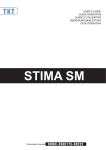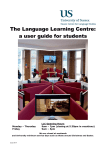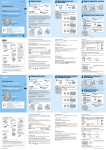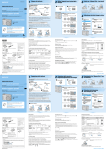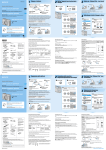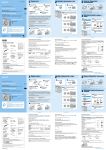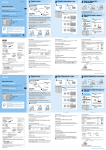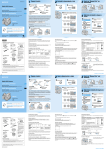Download Conditions of Service - Manual & Ancillary
Transcript
E52
THE UNIVERSITY OF SUSSEX
CONDITIONS OF EMPLOYMENT OF MANUAL AND ANCILLARY STAFFS
I
General
1.
In the interpretation of these Conditions of Employment the following definitions apply:(a)
A "full-time" employee is a person engaged to work a normal week of 36.5 hours
or more (see 9 below).
(b)
A "part-time" employee is a person engaged to work a normal week of less than
36.5 hours.
(c)
A "resident" employee is a person who is required to reside in University
accommodation as a condition of employment.
Other definitions are given elsewhere in these Conditions of Employment in the
following paragraphs as follows:-
(d)
A holiday on other days when the University is operating on minimum service is
defined in 27.
(e)
The "normal working week" is defined in 9.
(f)
"Overtime" is defined in 10.
Paragraphs (g) to (i) have been deleted.
(j)
Reference throughout this document to the masculine gender shall include the
feminine gender, and vice-versa, except where the context otherwise requires.
2.
Members of staff are ultimately responsible to the Vice-Chancellor for the satisfactory
performance of their duties, but in their day-to-day work each member of staff is
responsible to the officer specified in the letter of appointment as amended from time
to time.
3.
Unless an exception has been made by the Vice-Chancellor in any individual case,
members of staff other than those appointed to part-time or temporary posts are
required to reside within 20 miles of the University.
4.
In the case of full-time appointments to the University, members of staff may not hold
any other appointments except with the prior consent of the University.
5.
Members of staff of the University may be required, in accordance with the procedure
laid down in document E52A, to work in any University building.
6.
Members of staff working in the University areas concerned with the preparation or
serving of food are required to obtain a certificate that they are medically fit for such
work from a registered medical practitioner. If the practitioner states that the member
of staff is unfit for such work, or if the member of staff does not obtain such a
certificate within one week of the commencement of service, then their contract of
employment is void.
II
Pay, Hours of Work, Enhanced Payments
Rates of Pay
7.
The salary scales are published at
www.sussex.ac.uk/humanresources/personnel/salaryscalesratesofpay and form
part of these Conditions.
Remuneration is paid monthly on the last day of each month, in arrears, by bank credit.
Income tax is deducted as instructed by the Revenue and Customs.
The annual incremental date is 1 October, except that persons appointed or promoted
between 1 April and 30 September inclusive receive their first increment on 1 October of
the following calendar year. Increments are granted automatically but may be postponed or
withheld for a specified period for unsatisfactory work.
8.
Paragraph 8 has been deleted.
Normal Hours of Work and Working Week
9.
A normal working week for full-time employees shall consist of 36.5 hours. Except
where otherwise agreed or stated below the normal working hours are spread equally
over five days from Monday to Friday. Certain members of staff may be required to
work at weekends.
The normal working week is exclusive of meal breaks. The number of hours normally
worked in a week may vary in a cycle of duty providing that the average number of
hours per week for the complete cycle is 36.5 or more.
The working hours for Catering staff are spread across any five days out of seven
including weekends. Working hours generally fall within the hours of 5.30am to 10pm
(although evening hours will be until 11.30pm for two of the units in Bramber House –
Eat Central and the main production kitchen). Staff work a four-week rolling rota, i.e. a
rota where the shift patterns repeat themselves every four weeks. Catering Services
staff work an average of two weekend days per four week period (i.e. one weekend
every 4 weeks which equates to a maximum of 23 weekend days per annum, but not
necessarily a consecutive Saturday and Sunday) and Kitchen Staff work alternate
whole weekend shifts (maximum of 25 shifts or 49 weekend days per annum).
Overtime - Conditions for Payments and Rates
10.
Wherever possible employees should co-operate in working any necessary overtime.
As much advance warning as practicable of overtime working will be given but it is
unavoidable that some overtime occurs at short notice due to sickness and
emergencies.
A working week of 36.5 hours must be completely worked before overtime is payable
except in cases of authorised absence which will include sickness. When an
employee is working a cycle of duty which covers a period averaging 36.5 hours per
week, then the number of normal hours in each week will vary, as stipulated in the
employee's contract of employment, and overtime will be calculated on the basis of an
average of 36.5 hours per week.
2
Time worked in addition to the daily work which forms part of the normal working week
of 36.5 hours is counted as overtime and is paid at the following rates:Time and a half for hours worked beyond 36.5 hours on days 1-5 inclusive
that an individual works in their working week.
Time and three quarters for hours worked beyond 36.5 hours on either or
both of the 6th or 7th day worked in a week.
"Conditioned overtime" is where employees are conditioned (ie required by the
University) to work more than 36.5 hours a week as a normal and regular scheduled
feature of their employment: it excludes extra hours worked for staff shortage, or
occasional or abnormal work, but it includes regular scheduled work required for the
University whether by a requirement on each employee or by reliance on volunteers.
It can be seasonal, ie employees can be required to work an hour a day overtime in
term time but not in vacations. Voluntary conditioned overtime is defined in Document
E52B.
Work on a Bank/Public Holiday or minimum service day
10a. Double time will be paid for all hours worked on a bank/public holiday or minimum
service day, plus time off in lieu (TOIL) up to a maximum of an individual’s normal
working day, irrespective of the 36.5 hour threshold having been reached. Bank/public
holidays and minimum service days will be deemed to start at 12 midnight and end at
12 midnight, 24-hours later.
11.
Paragraph 11 has been deleted.
Additional Hours for Part-time Staff
12.
When additional hours are worked immediately before or after normal hours of duty, a
part-time employee is paid at the hourly rate of pay unless the number of hours
worked in the pay week exceeds 36.5, when overtime rates as stipulated in Paragraph
10 will apply.
13.
Paragraphs 13 to 17 have been deleted.
Stand-in Duties
18.
An employee required to undertake the duties of a job in a higher grade for a period of
one normal working day is paid at the rate for the higher grade during the period
providing all the duties and responsibilities of the higher grade job are undertaken.
The higher rate continues to be paid for each full day of stand-in duty worked
continuously after the first normal working day. This does not apply where the
requirement to act as deputy is included in the job.
Call Out Provision
19.
(For employees required to return to work at an unscheduled time, but excluding those
employees who receive a Call Out Allowance.)
(a)
To qualify for payment in accordance with this paragraph, employees must:
3
(b)
(i)
have ceased work and left the place of employment and been recalled to
work, or
(ii)
have been notified before ceasing work to return to work at a time not less
than two hours after the normal finishing time.
Where the recall to work is at a time which is more than three hours before their
normal commencing time, payment shall be as follows:
(i)
Return to work and not required
or required for less than two
hours
A minimum payment as for two
hours at the rate of time-and-ahalf or the rate appropriate to
the day and time whichever is
the greater.
(ii)
Time worked up to and including
three hours
Time-and-a-half or the rate
appropriate to the day and time
whichever is the greater.
(iii)
Time worked in excess of three
hours
Double-time for hours worked in
excess of three up to normal
commencing time.
(iv)
Work after midnight
Double-time for all hours worked
up to normal commencing time,
subject to a minimum payment
under (i) above.
(c)
Where the recall to work is three hours or less before normal commencing time
an employee shall be paid time-and-a-half or the rate appropriate to the day and
time, whichever is the greater, for the hours worked and plain time in respect of
any period between the finish of the work and normal commencing time.
(d)
This payment does not apply to staff where the employee is given the option not
to return to work as requested, or to arrangements which receive the split shift
supplement.
III
Tenure
20.
Members of staff are appointed on probation for a period of three months unless
otherwise stated in their letter of appointment. Members of staff transferred or
promoted on these conditions will not be placed on probation for a second time.
During the probationary period all these Conditions of Employment apply except that
the appointment may be terminated by one week's notice in writing on either side.
During the last month of the probationary period consideration is given to confirming
the member's appointment or to extending it for a further period. If the appointment is
not confirmed on the expiry of any probationary period or of any extension to it, the
appointment will terminate. The member will be informed in writing of the University's
decision at least one week before the appointment terminates in this way.
4
21.
Appointments may be terminated at any time by either side giving notice in writing, the
minimum amount of notice being as follows:
By the University
Length of Notice
Where the employee has a period of One month
continuous service of less than five years:
Where the employee has a period of Three months
continuous service of five years or more
By the member of staff
One month*
* Members of staff are encouraged to give as much notice as possible when they intend to
leave the University.
22.
Where a member of staff fails to give or serve the prescribed period of notice, the
University may offset against any amounts due for holiday entitlement a sum for the
period of notice not served. Payment will however be made for all hours actually
worked.
23.
Paragraph 23 has been removed following the abolition of the statutory retirement age.
24.
Subject to the above provisions, appointments to the staff of the University are made
either indefinitely or for a specified period which is stated in the letter of appointment.
Superannuation and Pension Arrangements
25.
The appointment is pensionable. The relevant scheme for staff on grades 1 to 6 is the
Sussex Group Stakeholder Scheme. (The University of Sussex Pension and
Assurance Scheme has closed to new members.)
National Insurance Contributions
26.
National Insurance contributions are deducted monthly from salaries. The amount of the
contribution depends on whether or not the member is contracted out of the State Second
Pension (S2P).
IV
Holidays and Sick Leave
27.
Members of the manual and ancillary staff are entitled in the leave year, 1st October to
30th September, to holidays with pay in accordance with the Holiday Scheme for
Manual and Ancillary Staff (Document E53). This Scheme entitles members of staff to
paid holidays on the days when the University is operating on minimum service, at
present six, as well as on the eight public/bank holidays, provided that members of
staff may be required to work on any of these days and if they are so required to work
they will be entitled to special payments and/or to days off in lieu in accordance with
the Scheme. Members of staff are also entitled to annual holidays with pay of twenty
days, which in the first year of service accrues at the rate of 1/12th for each completed
calendar month of continuous service. For the purpose of this provision, part months'
service at the start and finish of employment within the first year of service shall be
aggregated and, if 30 or more calendar days, the aggregate period shall be treated as
a month's service for the determination of leave. In addition to this standard holiday
entitlement full time employees are entitled to one additional day of holiday in the
leave year after they have completed three years of service with the University, one
additional day of holiday in the leave year after they have completed four years of
service and one additional day of holiday in the leave year after they have completed
five years of service. As stated in the Scheme, the University maintains the right to
5
'lay-off' part-time members of the catering staff during vacations, if their services are
not required, on the terms set out in the Scheme.
28.
Members of the manual and ancillary staff who are absent from duty owing to illness,
including injury or other disability, are entitled to the benefits of the University Sickness
Benefit Scheme (Document E49A). Members of staff absent from duty owing to
illness should inform the University of such absence immediately, or as soon as is
practicably possible. Members of staff ill for more than three days must submit a self
certificate and if ill for more than seven days a doctor's certificate must be submitted.
29.
The monthly salary payable during annual holidays and sick leave shall be the rate
ordinarily payable for the basic working week, together with payments (if any) for
conditioned overtime which would have been worked in that week. (Porters in the
residential area who take their holidays in vacations are paid conditioned overtime
based on the average of the previous term.)
30
Details of entitlement to maternity leave, paternity leave, adoption leave and parental
leave are available on the Human Resources website or from the Human Resources
office.
V
Trade Union Membership andActivities
31.
Members of staff of the University have the right:(a)
to be a member of such a trade union as they may choose;
(b)
to refuse to be a member of any particular trade union or other organisation of
workers;
(c)
if they are a member of a trade union to take part, at any appropriate time, in
the activities of that union (including any activities as, or with a view to
becoming, an official of that union), and to seek or accept election or
appointment as an official of that union.
("Appropriate time" in this paragraph means outside normal working hours or, if
the consent of the officer to whom the member of staff is responsible, as in
Paragraph 2, for the day-to-day work has been given, within working hours. For
instance, in accordance with the Procedure Agreements, there may be
occasions when union meetings are held during working hours.)
32.
The University has recognised Unison as the appropriate trade union for manual and
ancillary staffs for the purpose of:
(1)
union recruitment, and
(2)
representation of their own members, and
(3)
representation and negotiation on behalf of Unison members.
Similarly the University has recognised Unite for their Craft membership.
6
VI
Grievance Procedure
33.
Members of staff having an individual grievance, complaint or problem relating to
employment should normally discuss the matter first with the person specified for this
purpose on appointment or as amended from time to time. At any discussions
members of staff may, if they wish, be accompanied by a friend who may be a Union
representative. The procedure to be followed if the grievance is not satisfactorily
settled at the initial stage is set out in the Staff Grievance Procedure, copies of which
are available from the Human Resources Office.
VII
Conditions Applicable to Part-Time and Temporary / Fixed Term Members of
Staff
34.
Except where otherwise stated, all these conditions of employment apply to temporary
(or fixed term) appointments and to part-time appointments.
VIII
Amendment of Conditions
35.
The University reserves the right to amend the foregoing conditions of employment
after negotiation, in accordance with the Procedure Agreements, with Unison and
Unite, as appropriate.
HR Office
April 2013
7
NOTES WHICH ARE NOT PART OF THE CONDITIONS
DATA PROTECTION ACT
The holding or processing of information on individuals which a member of staff may handle in the course of
his or her duties is subject to the Data Protection Act 1984 and the University's Code of Practice on
Safeguarding the Confidentiality of Personal Information. It is the policy of the University that all members of
staff must comply with this Act and the Code of Practice. The Data Protection Act refers to information stored
in computers as widely defined, including word processors, ("equipment operating automatically in response to
instructions"), whereas the Code of Practice refers to all personal information about an individual learned in the
course of a member of staff's duties. The University has designated a Data Protection Officer to oversee
compliance with the Act.
The attention of members of staff is drawn in particular to the following points:
1.
Information concerning individuals learned in the course of a member of staff's duties must not be
communicated to other persons or bodies unless required to do so by law or for the proper purposes of
University business, or with the consent of the individual concerned, and any disclosure of information
must be consistent with the University's registration under the Data Protection Act.
2.
It is the responsibility of all members of staff to ensure:
(i)
that appropriate measures are taken to ensure that information which they obtain, including
information given on computer print-out, microfiche etc, is not accidentally divulged to
unauthorised persons, and that appropriate care is taken in disposing of printed information and
(ii)
that the measures relating to their particular offices, to ensure the security of personal
information, are applied and
(iii)
that any personal data they handle has been registered under the Data Protection Act, and that
the Data Protection Officer is informed of any data which is not registered or of any changes or
deletions that might affect the University's registration. For anyone handling personal data that
they do not themselves control, this responsibility is met by checking with the person who controls
the data.
A Code of Practice on the Data Protection Act, with Annexes on subject access requests and on
security has been issued, and Section Heads or appropriate academic officers will inform staff of
the security measures applicable to their office.
3.
Staff who are data holders may hold personal data only in accordance with the University's registration
under the Data Protection Act, except where a member of staff has chosen to register as a Data User
for his University academic work, and where a member of staff has chosen to be so registered he
should inform the Data Protection Officer. Data holders should make appropriate arrangements for
access to their data whenever they are absent from the University.
4.
No employee is permitted to remove from the University personal data with the intention of processing
this on another computer, unless such use is recognised and authorised as part of the system. The
standard of security at another site should be adequate having regard to this code of practice.
5.
The University will use its resources to support any employee or student who faces court proceedings
for alleged breaches of the Act connected with the University's registration, if that employee or student
has acted in a reasonable manner, and not in breach of this Code of Practice.
Copies of the Code of Practice on Safeguarding the Confidentiality of Personal Information, which gives staff
rights of access to their manual personal files, and of the Code of Practice on the Data Protection Act, may be
consulted for reference in School Offices, the Library, or the Human Resources Office.
E52A
THE UNIVERSITY OF SUSSEX
Statement of University Procedures concerning working in other buildings/sites
The University Conditions of Employment of Manual and Ancillary Staffs state:
"5. Members of staff of the University may be required, in accordance with the procedure laid down
in document E52A, to work in any University building."
The procedure agreed between the University and Unison and Unite is as follows:
(a)
Members of staff who are initially appointed to work in a particular building or buildings (eg
porters) will not normally be required to work either temporarily or permanently in another
building without their consent.
(b)
Members of staff not initially appointed to work in a particular building or buildings (eg catering
staff, craft staff) will not normally be required to work either temporarily or permanently on
another site without their consent.
(c)
Lists of those crafts and grounds staff who are willing to work on other sites will be prepared,
and requests to work at other sites will first be made to those listed. Only if there is no-one
available from the lists of volunteers will a person not on the list be asked to work at another
site.
(d)
Where an abnormal situation is held to exist, the question of re-allocation of staff will be
discussed with Unison or Unite representatives, as appropriate, as soon as possible.
HR Office
Revised October 2007
9
E52B
The University of Sussex
MANUAL AND ANCILLARY STAFFS
Voluntary Conditioned Overtime
1.
The definition and arrangements concerning Voluntary Conditioned Overtime were agreed by
the former Manual and Ancillary Staffs Committee on 24th February 1977 as follows:
(1)
The definition of Voluntary Conditioned Overtime includes the following:
(a)
the individual member of staff is not obliged to carry it out;
(b)
the University may reduce it or withdraw the request for it when necessary;
(c)
voluntary overtime is only regarded as conditioned when it has been carried out
regularly over a three month period, and is deemed to have ceased if it is not
continuous over a period of three months.
(d)
payment of voluntary conditioned overtime is not made for such overtime
occurring less frequently than once every four weeks.
(2)
Payment for voluntary conditioned overtime will be made during sick leave and holidays.
(3)
For the three month period immediately following a reduction in the amount of voluntary
conditioned overtime, payment during sick leave and holidays will continue to be made
on the basis of the voluntary conditioned overtime previously worked.
HR Office
June 2009
10










